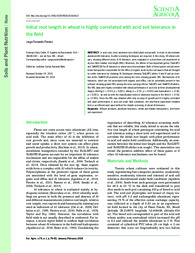Initial root length in wheat is highly correlated with acid soil tolerance in the field.
Initial root length in wheat is highly correlated with acid soil tolerance in the field.
Author(s): PEREIRA, J. F.
Summary: ABSTRACT: In acid soils, toxic aluminum ions inhibit plant root growth. In order to discriminate aluminum (Al) tolerance, trustful screening techniques are required. In this study, 20 wheat cultivars, showing different levels of Al tolerance, were evaluated in a short-term soil experiment to access their relative root length (RRL). Moreover, the alleles of two important genes (TaALMT1 and TaMATE1B) for Al tolerance in wheat were discriminated. Both of these genes encode membrane transporters responsible for the efflux of organic acids by the root apices that are thought to confer tolerance by chelating Al. Genotypes showing TaALMT1 alleles V and VI and an insertion at the TaMATE1B promoter were among the ones showing greater RRL. Mechanisms of Al tolerance, which are not associated with organic acid efflux, can be potentially present in two cultivars showing greater RRL among the ones carrying inferior TaALMT1 and TaMATE1B alleles. The RRL data were highly correlated with wheat performance in acid soil at three developmental stages, tillering (r = −0.93, p < 0.001), silking (r = −0.91, p < 0.001) and maturation (r = −0.90, p < 0.001), as well as with the classification index of aluminum toxicity in the field (r = −0.92, p < 0.001). Since the RRL was obtained after only six days of growth and it is highly correlated with plant performance in acid soil under field conditions, the short-term experiment detailed here is an efficient and rapid method for reliable screening of wheat Al tolerance.
Publication year: 2018
Types of publication: Journal article
Unit: Embrapa Dairy Cattle
Observation
Some of Embrapa's publications are published as ePub files. To read them, use or download one of the following free software options to your computer or mobile device. Android: Google Play Books; IOS: iBooks; Windows and Linux: Calibre.
Access other publications
Access the Agricultural Research Database (BDPA) to consult Embrapa's full library collection and records.
Visit Embrapa Bookstore to purchase books and other publications sold by Embrapa.

